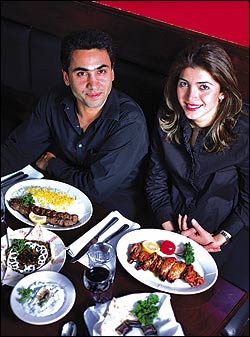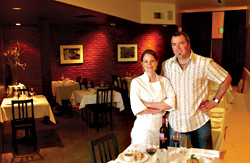Bamiyan seems as much at the end of the world with respect to Seattle as Afghanistan seemed before 9/11, when burqa wasn’t yet a household word. Quite a distance from the only other local Afghani restaurant of note (Wallingford’s Kabul), Bamiyan is located—some would say lost—in Gilman Village, Issaquah’s quaintest outdoor mall.
According to owner and manager Amir Sabour, some of the flavors that distinguish Afghani cuisine make it a hard sell to cautious suburbanites. “There’s coriander seeds, cumin seeds, which are pretty much involved with most of the food,” he told me. “There are lots of herbs like fenugreek, which you probably don’t know. And lots of people, they ask: ‘What’s the fenugreek?’ [It’s a medicinal herb whose seeds are said to taste like maple syrup.] Some people, they don’t want to try different variety.”
That’s a shame, because one dinner at Bamiyan will expose you to more flavors, familiar and unknown, than five meals at most Middle Eastern restaurants. A simple starter called quruti ($6.50), for example, showcases Afghani cuisine’s creative use of yogurt. Thick, triangular slices of bread are dressed in garlic-tinged yogurt and crispy fried onions; the bread takes on a cakelike consistency due to the yogurt, which—along with the onions—contributes a delicate, sweet-savory sensation, making the dish a sort of quasi-dessert.
On another occasion, a friend and I ordered the torshi platter ($5.50), a sampler of spicy relishes. It reminded me instantly of the scene in L.A. Story where Steve Martin and Victoria Tennant order dinner and get about a thimbleful of food on a huge white plate. True, the platter gives you only itsy-bitsy bursts of the Afghani spice palette, but eaten with hearty potato bolani ($6.25), samosalike pastries seasoned lightly with scallions and cilantro, they go a long way.
Standout meatless entrées at Bamiyan include a wonderful badenjan borani ($11.50, nonvegetarian $12.99), which features small, round, thick-cut eggplant steaks baked to tender perfection and served with garlic-mint yogurt and a mellow tomato sauce. Lacking the acidity that sometimes plagues Italian marinara, Bamiyan’s sauce plays several roles on the menu; one night, it accompanied my salmon special ($15), beautifully complementing a fragrant fillet rubbed with mint and other herbs, then almost blackened for a crispy-juicy texture. The sauce was just as vital to my friend’s order of ashak (vegetarian $12.95; nonvegetarian, $13.75): The half-moon dumplings, filled with green herbs (cilantro, scallions, parsley, and chives), were topped with yogurt and tomato sauces, which formed a milder, creamier hybrid sauce as she ate.
Carnivores, of course, can really go to town at a restaurant that serves kabobs. The meat skewers at Bamiyan range from lamb-loin cubes soaked in a secret-recipe marinade ($16) to chicken chunks seasoned with saffron, ginger, garlic, cayenne, and yogurt ($13). (Sabour says the restaurant’s lamb comes exclusively from Australia or New Zealand; their chicken is hormone-free and local.) The rack of lamb ($18.25), marinated in garlic, coriander, turmeric, lemon juice, and yogurt, is apparently a crowd favorite: Sabour, who works as a server in addition to managing, said some customers consider it the best lamb they’ve ever eaten. My dining companion found the marinade highly flavorful and the meat delicious, though a little overdone for her taste.
What Sabour is really excited about these days is the new Persian menu, which isn’t replacing but merely supplementing Bamiyan’s Afghani fare. Inaugurated less than two weeks ago, it includes amazing-sounding dishes like marinated whole Cornish game hen ($14.50) and chicken cooked in pomegranate sauce ($10.95). The way in which Persian differs from Afghani, Sabour said, is in its simplicity. “Afghani cuisine has a little more spice and bite to it,” he explained. “Persian food is less spicy.” Though he feels that Eastsiders are gradually warming up to Bamiyan’s kaleidoscopic way with herbs and spices, the Persian option lets risk-wary diners work their way up to the complexity of Afghani food.
So why isn’t this restaurant packed? “Some days the restaurant business is busy, some days slow,” Sabour assured me. “It’s going to take time for us, for people to know about the food. We are pretty much new, and we started very slow.” Hopefully the ultimate convincer—for suburban- and Seattleites alike—will be Afghani cuisine’s ingenious blend of seasonings and preparations more commonly associated with Spain, India, Thailand, Morocco, and Italy. Afghanistan may be a world away, but Issaquah is right around the corner.
Bamiyan Afghani Restaurant, 317 N.W. Gilman Blvd., 425-391-8081, ISSAQUAH. 11 a.m.– 9:30 p.m. Sun.–Thurs.; 11 a.m.–10 p.m. Fri.–Sat.








